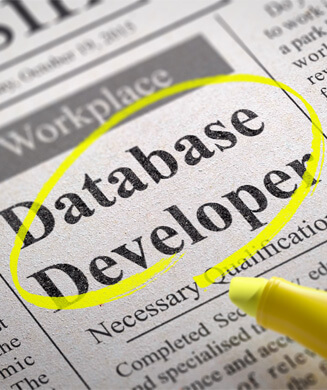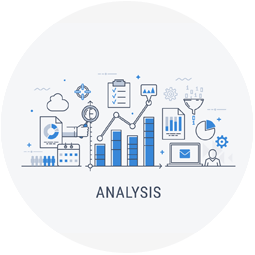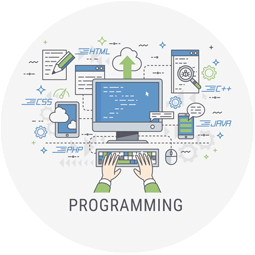Database programmer
Learn programming and basic administration in Oracle database
-
Course topics:relational databases, Oracle, SQL, PL/SQL programming, query optimization, database administration
-
Duration:80h for the course + 40 hours working at home with our materials = 120 hours in total
-
Requirements:ability to think analytically / basic programming in any language or basic SQL and knowledge of MS Excel, MS Access
-
Intended for:- people who have had contact with programming in other languages and want to develop in the direction of databases
- people who have experience with databases as analysts and want to develop towards database design and programming -
Class types:
- weekends (Sat-Sun, every 2 weeks on average)
- day classes (a 4-day block and two 3-day blocks)
-
Group:Stationary classes - max 12 people in the room.
Remote courses - up to 17 people in total.
-
Location:Warsaw, Krakow, Katowice, Gdansk, Poznan, Wroclaw and remotely (online live with an instructor and the group)
-
Flexibility:a) You can cancel up to 15 days before the start
b) during classes you can:
- switch from on-site to remote mode
- switch from remote to on-site classes
- receive a recording in case of unexpected events
- suspend participation and continue later
(depending on the availability of free spots) -
Price:1140 EUR
Other learning options
Short courses:
Oracle Database SQL Oracle Database PL/SQL Oracle database administration
Do you work with large amounts of data on a daily basis?
Or maybe you have had contact with a programming language before? If you have a scientific mind and want to become a database programmer - this bootcamp is for you. You will have 10 days of intensive learning from scratch! The course will be led by our instructor – a programmer and database administrator with many years of experience and excellent didactic preparation. The course is 100% practice-oriented which means no boring lectures.

Avalanche of data
- The first hard disk in 1956 had a capacity of 3.75 MB – the equivalent of one mp3 song or a photo taken with a smartphone.
- Going to a web page means loading in the first moment, for example, 2 MB of data - that much would not fit on a 3.5-inch floppy disk, which was the standard only 15 years ago.
- In 1992, 100 GB of data were created worldwide every day,
- in 1997 – 100 GB per hour,
- in 2002 – 100 GB per second,
- in 2018, it is approximately 50 000 GB of data per second.

Today's world is overloaded with data. We are witnessing a rapid (almost exponential) increase in the amount of stored data. In 2009 the world stored 0,8 zettabytes<, ZB (zettabyte) - 10^21 bytes, that is one billion terabytes. According to forecasts, in 2020 there will be 35 ZB, which is 44 times more. Only 0.5% f this data is properly processed and used. The reason? There is a lot of data and it is difficult to store it, let alone process it.
source: www.computerworld.pl
Every decision in business depends on DATA!
Everything depends on data!
Marketing, sales and production decisions depend on the knowledge hidden in data. Decisions about the development of large concerns and popular brands are based on data. The ability to process and analyse data is a must in today's world. In order to do this well, data must first be securely stored and managed - an absolute must! A good, safe and optimally managed database allows efficient data processing and, as a result, making accurate, effective and competitive decisions - which guarantees business success.

Database programmer – a stable job
A career as a database programmer is ideal for someone who dreams of a stable, well-paid corporate job. Why?
Because the market needs good database specialists and absorbs any amount of them! Large organizations (mainly international corporations), due to the huge amount of analysed data, have highly developed teams, in which many database specialists work - from programmers, administrators, through team managers and analysts. They design databases, collect and standardize data from various internal and external sources, implement business rules according to which data is searched, processed and stored and they also create various applications, and build models for advanced data analysis.

The programme of our bootcamp – "become a database developer"

Database theory
construction, design, data storage, relationships between data

SQL language for the Oracle database
preparing database queries, extracting information of interest to us from the database

Introduction to PL / SQL
programming in the Oracle database, which gives us many more possibilities of data processing than the SQL queries alone

The basics of Oracle database administration
creating a new database, database management

Introduction to optimising an Oracle database
how to make processing and retrieving data from the database more efficient, what to do to make our queries run faster
Certificate

After completing the course, you will receive a certificate signed by ALX with a detailed list of your acquired skills. Each certificate has a unique identifier and an electronic version (regardless of whether the paper version has also been ordered). If you wish, you can share your certificate by pasting its URL – for example to your profile on a social or professional network or into your CV.
The programme of our course also covers the full range of requirements for the 1Z0-071 Oracle Database SQL exam, which after passing allows you to obtain the Oracle Database SQL Certified Associate certificate. The Oracle Database Administration block, on the other hand, mostly covers topics required for the 1Z0-062 Oracle database 12c Administration exam. For those interested, passing this exam in conjunction with the 1Z0-071 Oracle Database SQL exam allows you to obtain the Oracle Database 12c Administrator Certified Associate certificate.
Why Oracle?
Oracle is a standard in the IT world (according to the DB-Engines ranking).
It is a natural course of study for people who want to work in large corporations. It is the most popular database system in the world. It is used in the biggest corporations in Poland and the world - banking, insurance, telecommunications, etc. It allows the processing of millions of data records, various operations, such as payment transactions, telephone call records, customer requests, etc. According to many independent analysts, Oracle is the best relational database system distinguished by its functionality, high performance and stability.
Who is most likely to opt for this bootcamp?
Who is this course for?

For analysts
who want to become database programmers. Someone who works with large data sets on a daily basis, has a scientific mind, uses advanced Excel, is good with tools like Access, VBA and maybe knows the basics of SQL?

For programmers
who work in junior positions or have learned a programming language on their own, but wish to develop their career further in the direction of databases. For freelance programmers who dream of a stable, well-paid job in a corporation.
If you are more interested in data analysis using Microsoft tools such as Excel, Access, or SQL Server than programming, storing and processing data.
Bootcamp. How do we teach?
We teach by using the bootcamp method. The word "bootcamp" comes from the US Army and means extreme training which transforms recruits into proper soldiers - capable of fighting immediately. Programming bootcamps are intense, practice-oriented training programs. Students will spend many hours working hard. After finishing our bootcamp you are a junior programmer ready to go to work (but also to continue learning).

Our trainers are outstanding specialists
Not every good programmer will be a good instructor because not everyone can speak in such a way that others want to listen and who also understand the material. We can do this – our staff has been working together for years, no one is here by chance. We form a good team; our instructors are the best! The bootcamp is led by an experienced industry specialist. He is a database expert with experience in teaching and software development. He conducts lively classes, rich in realistic examples.
Practice, practice, practice
a few words about how we teach
This bootcamp is conducted in the form of practical workshops. This means that there will be no monologue from the lecturer and no PowerPoint presentation as it is at university. The bootcamp is also different from typical courses e.g. in Access, where the focus is on the capabilities and the interface of the program. Here we focus on a broad view of database design, understanding how to work with them, more "direct" and "real" programming than "clicking on the interface" etc.
Requirements.
This is a bootcamp from scratch, but....
This bootcamp will prepare you for a junior database programmer position. You do not need to have any prior experience with database programming. We teach from scratch, but it is advisable to have some previous experience with data analysis, for example in Excel, or with a programming language – it doesn't have to be advanced, knowledge from school, studies, or tutorials is enough. Database programming is intended for people with a specific profile. Database developers usually have excellent logical thinking skills, can solve complex problems - and enjoy doing it. They have well-developed reading skills and a desire to constantly improve their knowledge. Database developers often show a clear ability to order or arrange things according to a set of rules - they do this even in their private life away from the computer ;-)
Further career paths for course graduates
This bootcamp is an excellent starting point for those who want to progress into Big Data, data warehousing, or business intelligence in the future.

"Can I become a good database programmer without studying computer science/mathematics?"
This is a question we hear very often. Well... YES – you can be a great database programmer without a degree in science. The only condition is well-developed analytical skills. If you remember from school that mathematical/logical tasks caused you pain, and the sight of a maths teacher gave you goosebumps – don't come to this bootcamp, because you won't be able to handle it ;)
Is bootcamp a big expense?
Spread it out in installments at no additional cost.

Participation in the bootcamp is an important investment for many of our students. It is an investment in your skills and a chance to get your dream, well-paid job in the IT industry.
It is also a considerable expense!
We know this and that is why we offer convenient fees for our bootcamps in an installment system without any additional costs.
You pay only as much as the course costs.
How to pay for bootcamp in installments?

The process is very simple - you do not have to contact any bank, you do not need to undergo complex verifications, you only need an ID document - you handle everything with our company. Check it out >>
One bootcamp, two motivations
-
![Dla pracownika]()
Are you a private individual? If you do well then after the bootcamp we will help you find a job in IT.
-
![Dla pracodawcy]()
Are you an employer? Develop your employee's skills – send them to bootcamp!
Testimonials
Read what our customers say about our work.

The training was conducted at a high technical and organizational level and the involvement of the organizers deserves high recognition.

The participants of the course highly rated the training program, teaching materials as well as the competences and commitment of the lecturers. (...) We recommend ALX as a partner guaranteeing the proper performance of the service.

We are very pleased with the organization of the training. All trainings and trainers received high marks in surveys from our employees.

The implementation of the training program was highly appreciated by the course participants. ALX can be recommended as a reliable business partner in the field of IT training, with a staff of lecturers with extensive experience.
Course programme
Oracle databases and the SQL language
- Introduction to databases:
- basic concepts related to databases
- relational data model
- transactional databases.
- A few words about Oracle:
- DBMS architecture,
- versions and licenses,
- available tools,
- environment configuration for work.
- Create simple SQL queries:
- displaying data retrieved from the database,
- sorting and limiting the number of returned rows,
- using alternative column names – aliases,
- basic mathematical operations and combining strings,
- data filtering,
- substitution of variables during query execution,
- NULL value and its handling in the database,
- elimination of repetitive rows – DISTINCT clause.
- Extended data selection:
- logical operators for conjunction and negation of conditions,
- comparison operators (>, >=, =, <, <=, <>, !=),
- range operator (BETWEEN),
- membership operator (IN),
- pattern operator (LIKE).
- Scalar functions
- operations related to dates and time,
- character type operations,
- numeric functions
- conditional functions, logical operators (CASE, DECODE, COALESCE,
NVL, NVL2), - implicit type conversion,
- functions related to type conversion: TO_CHAR, TO_DATE, TO_NUMBER,
- use of functions in all places of the query
- Data aggregation
- grouping functions,
- filtering rows after aggregation.
- Set operations
- UNION, UNION ALL, MINUS, INTERSECT operators,
- checking the order of the rows returned by operations on sets.
- Joining data sets:
- available join criteria, equijoin, theta-join, natural joins
- Oracle and ANSI SQL syntax
- cross joins,
- external joins,
- self joins,
- anti joins.
- Nested queries (subqueries)
- scope of subqueries,
- scalar subqueries,
- multi-line subqueries,
- correlated and uncorrelated subqueries.
- DML (Data Manipulation Language) commands and transactions
- inserting rows,
- deleting data from the database,
- changing data in the database,
- the scope of constraints when performing DML operations
- Transaction management
- transaction validation, rollback, savepoints,
- Locks on concurrent execution of operations,
- deadlocks,
- UNDO space principles and FLASHBACK operations.
- DDL (Data Definition Language) commands
- Creating, deleting and modifying tables, column types,
- constraints, primary and foreign keys,
- creating simple and complex views,
- schemas in the database,
- other database objects: indexes, synonyms (public and private), sequences.
- Database design
- Basic information about standardisation,
- normalization vs. efficiency
- selecting appropriate data types
- good practices of creating and naming objects
Programming in Oracle
- Introduction to PL/SQL programming:
- lexical units and conventions,
- anonymous blocks and programs,
- Executable block and declaration block,
- running anonymous blocks and programs.
- Defining and handling variables:
- declaring and changing the values of variables,
- use of standard data types in variables,
- %TYPE and %ROWTYPE attributes,
- working with compound types, custom compound types,
- Records, tables and record tables,
- constants.
- Structured programming:
- control statements: conditions, loops.
- INTO clause
- use of SQL functions,
- exception handling, typical built-in exceptions,
- creating your own exceptions,
- labels, visibility of names, nested blocks.
- Cursors:
- implicit and explicit cursors,
- cursors with parameters,
- row blocking (FOR UPDATE clause),
- WHERE CURRENT OF clause.
- Program development:
- stored procedures,
- creating functions with their use in SQL,
- parameters in programs,
- ways to call programs.
- Packages:
- package construction and dependencies,
- running packages,
- polymorphism in packages (overloading),
- embedded packages.
- Triggers:
- DML triggers at the command and line level,
- DML triggers on views,
- DDL command triggers,
- triggers on system events.
- Dynamic SQL:
- the need to use dynamic SQL, contraindications,
- native dynamic SQL,
- DBMS_SQL package.
Administration of Oracle database:
- Introduction to databases:
- basic concepts related to databases
- relational data model
- transactional databases
- Oracle versions and licenses
- database tools
- database versus data instance
- basic administrator tasks
- Configuring the network environment:
- Oracle engine operation logic in a network environment
- static and dynamic listener
- registering a database in the system
- oracle Net Configuration Assistant
- database link
- Physical and logical structure of the database:
- logical breakdown and relationship with physical data structure
- contents of database blocks
- creation of tablespace
- system tablespaces
- Transaction management:
- validation, rollback of transactions, savepoints
- locks on concurrent execution of operations
- deadlocks
- UNDO space principle and FLASHBACK operations
- ORACLE file architecture:
- creation and management of control files
- server parameter files – binary and text
- redo log files
- archived redo log files
- backup files
- use of message log – alert log
- trace files
- password files
- Database instance architecture and management:
- database parameters
- parameter initialization types
- ADR
- instance memory structures
- memory management using AMM and ASMM
- background processes
- database dictionaries and system views
- Launching and shutting down an instance:
- launch modes
- shutdown modes
- checking the database status
- database services
- User and rights management:
- user rights
- inheritance of objects and system privileges
- built-in roles and creating your own roles
- administrator accounts
- management of users and roles in container databases
- database profiles

